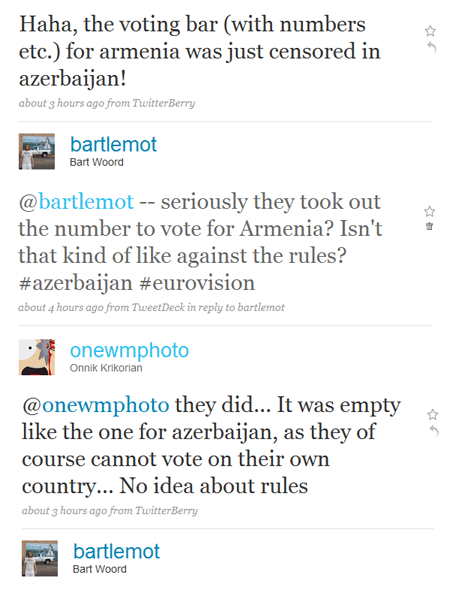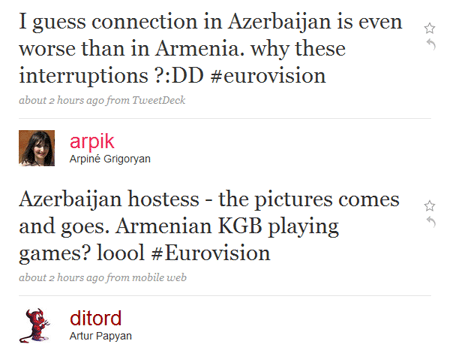Ethnic rivalry wins over kitsch in the Caucasus
Foreign Policy magazine called the Eurovision Song Contest the "giddiest, stupidest, campiest, silliest international competition of them all," but don’t tell that to anyone in the South Caucasus. Here, many take it very seriously indeed. With the opportunity on hand to perpetuate decades of animosity and years of ethnic hate, if Eurovision was meant to bring nations together, in this region it instead achieves the exact opposite.
It all started in February with an anti-Putin disco number resulting in Georgia’s eventual boycott of the contest held in Moscow, but more controversy emerged this week when Azerbaijan noticed the presence of a statue from the disputed territory of Nagorno Karabakh in Armenia’s presentation video. Complaints to the competition organizers eventually saw it removed, but the dispute didn’t end there.
During the televoting for tonight’s final, for example, one user on Twitter reported that the number for Armenia had apparently been omitted from the simultaneous retransmission in Azerbaijan.

Armenia’s broadcast was not without its problems either, with tweets indicating that the signal dropped for unknown reasons during Azerbaijan’s turn to announce the results of its vote live on air. Although there is nothing to suggest that this was anything other than a technical problem, some in Armenia gleefully wondered if the glitch was deliberate. True, there is nothing to suggest that it wasn’t at time of writing, but anyway.

Regardless, it didn’t end there, with Armenia firing the final salvo at Azerbaijan in the form of its presenter, last year’s entrant Sirusho, who used the opportunity to display a photograph of the offending monument which probably started the whole spat in the first place. Indicating that the action had been coordinated at the highest levels, a huge LCD screen in Yerevan’s Republic Square was shown carrying the image behind the singer.
Naturally, many Armenians were delighted, and not least because it probably softened the blow of finishing well below Azerbaijan when all the votes were in and the final results announced.

All petty bickering, perhaps, but as the number of tweets on both the Armenian and Azeri entries skyrocketed enough to be featured as a Twitter trend, some initially feared the worst.

User BobKazak wasn’t far off the mark, of course, and while music lovers everywhere can now sigh in relief that Eurovision has been and finally gone, local media, forums and blogs in both countries will likely continue the war of words over the coming days and weeks. Meanwhile, the rest of the world will move on unaware and oblivious to the somewhat simplistic ethnic politics at play in an event as mediocre and insignificant as Eurovision.
"I really thought that the picture the Armenian presenter was showing was the Easter Island statues," said one tweet after the competition had ended, while others might simply wonder if the television stations of both republics will ever be as active in actually preparing their respective populations for peace. For now, however, the likelihood of that ever happening seems as far away as ever.